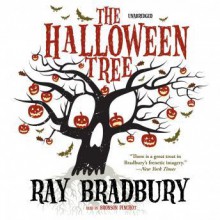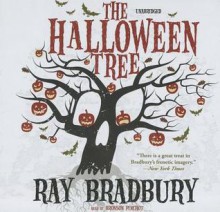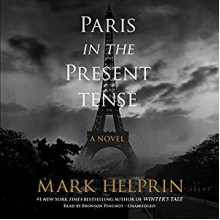


Bradbury gifts us with his wonderful imagery and realistically grubby little boys, as usual, which made reading this book worthwhile. As a story, though, it was not nearly as engaging as I usually find his work. It probably works better for a young audience, as a not-overtly-scary tale of the real origins of Halloween, the meaning of death and sacrifice, and explores some different cultural ideas of death and the afterlife. I was most struck by the bleak, yet accurate description of how time changes for us as we become adults.
Audiobook version, via Audible. I’m not sure what it is about Bronson Pinchot’s readings that I love so much. He doesn’t really try to provide distinct voices for the dialogue, but his performance is more that of a wonderful storyteller, using inflection and pacing to draw us in and keep us spellbound. Although this won’t be one of my favorite Bradbury stories, I think I’d like to have an illustrated hardcover, because such beautiful images painted in words just deserve to be brought to life visually as well.

I read this for the 2018 Halloween Bingo. The square is Classic Horror - Horror fiction that was published prior to 1980 (Called 9/1/18). This book fits because it was originally published in 1972.

I reviewed a paper copy of this back in February, so I won't be writing a summary this time around and don't plan on writing a lengthy review.
I definitely preferred this in paper form. Although Bronson Pinchot did an excellent job reading the product description pages in a cheerful and comforting advertiser voice, it wasn't quite the same as getting to see the images. I know that the library checkout included an enhanced content PDF download that may have had all of those images, but I couldn't figure out how to download them on my phone (if that was even possible) and, even if I could have, it still wouldn't have been the same as reading the text and having it all right there.
Tai Sammons was okay as the narrator of the bulk of the text. She fit Amy reasonably well, and I thought she did an excellent job with Ruth Anne. Her Trinity voice grated, but that was probably the point. I really didn't like her take on Basil, though, and overall I felt like her narration leeched out a lot of the creepiness I remembered from my initial reading of the book. Then again, that might just have been due to me having read it before and knowing what would happen.
My favorite part of the book was still the bit where Amy was trapped in the Liripip. It was an excellent use of the location and Amy's Orsk employee skillset.
All in all, this was a decent audiobook, but I'm glad my first exposure to the story was via a paper copy of the book.
Rating Note:
Yes, that's a whole star and a half less than the rating I gave the paper version. Again, I'm not sure whether it's the format or my mood.
(Original review posted on A Library Girl's Familiar Diversions.)

Paris in the Present Tense, Mark Helprin; Bronson Pinchot, narrator This book is written with such a lyrical beauty, the reader is able to visualize every page as if they themselves were written into the novel. Although there is often a heavy emotional content, because of the nature of the story which is about Jules’ life, and therefore, it encompasses the Holocaust and loss, as well as romance and familial responsibility, there is also a distinct touch of humor throughout the narrative in many of the conversations between the characters which prevents the story from becoming overwhelmingly morose. Hidden in an attic, in 1940, Catherine Latour gave birth to a son. The child, Jules, was born into a world at war. Four years later, this quiet child watched as his parents were murdered. He was knocked unconscious by the butt of a rifle. The sadists were still active, although their war was lost. Jules became a cellist, like his father had been. Although he never achieved greatness, he taught at the Sorbonne, in Paris, where he lived with his wife Jacqueline, until her death. Their daughter Catherine and her husband David had a child named Luke who was suffering with Leukemia. Jules felt that he failed everyone because he could not prevent their deaths…not his parents, not his wife’s, and not the possible death of his grandson. He wanted his daughter to move to America where the threat of anti-Semitism would not hang over them as it did in Paris and where his grandson might be able to get a more hopeful prognosis. It was growing apparent that France was not very safe for Jews. However, it was also not very safe for people of color or Muslims. The book exposed the racial bias in France through the narrative. Now 74, working in a limited capacity at the Sorbonne, as his schedule had been curtailed, he realized that he did not have the money to help his daughter to save her child. One night, he meets with his oldest friend, Francois, and he confides his disappointments in life to him. Francois tells him about the possibility of a job writing telephone hold music for a lucrative sum. Jules is interested because it might provide him with a way to save his grandson. Walking back from that dinner, he witnessed the brutal beating of a Hassidic boy by three thugs. Before they could behead him, he intervened and killed two of the three. When the boy he saved turns on him and accused him of killing his “friends”, instead of admitting the attack against him, witnesses appeared and called the police. Jules became a fugitive. He ran. Shortly after this occurred, Jules accepted the opportunity to write the background music for the telephone. He flew to America to meet with the company big shots. While meeting with the board of the mega company, Acorn, the company that had hired him, he discovered that they were going to renege on their promises. He is distraught. He consulted a lawyer, but discovered that he could not afford to fight them. While in America, he also discovered that he has a life-threatening aneurism and is advised that if he wants to live, he must lead a quiet life and rest in order to avoid aggravating the condition. Even more desperate now, with this knowledge, he planned his revenge against Acorn, which if successful, would surely help his daughter. He contacted an insurance company that Acorn owned and began to set his plan in motion. Jules was an interesting character. He was disappointed with his performance in life, but no one is perfect. When he discovers that others had clay feet, however, it did not make him feel better about what he perceived were his own. His life was a contradiction in other ways. On the one hand, while he still mourned the death of his parents and the death of his wife, on the other he was often infatuated and tempted by beautiful women. He saw the beauty in music and other aspects of the world, likening music to the voice of G-d. Jules seemed to have the uncanny natural ability to see truth and beauty in simple things. Yet he also saw failure and sadness whenever he looked back at his own life’s accomplishments. The book shines a light on the ability of love to cross boundaries. Muslims could love Jews, Catholics could love Muslims, the old and young might sometimes have May/December relationships that had true meaning. While there was prejudice in some places against Jews and people of color or Arab background, in other places they got along well together. In some ways, the book offered a way forward in the face of the prejudice that existed. The book really illustrated the racial bias that has existed for decades and is so prevalent in industry, even when it is kept under wraps. It also illuminated the power and greed of corporations and the lack of ethics in the management that ran the self-serving companies. A moving moment in the book occurred when a wealthy older character who was dying, and had, like Jules, lived through and survived the Holocaust, decided not to wash off the swastika that had been painted on the wall of his house, stating that his world had come full circle. As it began it ended. However, it also ended with own his children betraying him as they had also been corrupted by the greed that sometimes comes with wealth. As his world ended and his memories died, would the world return to brutality or would their be hope for the future? On another tack, it was refreshing to read a book in which language and sex was not used gratuitously to attract a certain kind of reader. The book will make you think about life and its meaning, people and their behavior, love and how it enhances life and also how it sometimes diminishes it. The narrator did a very good job reading the book, expressing the appropriate tone and mood for each scene, although there were times when two men were speaking that it was hard to discern when one stopped and the other began.